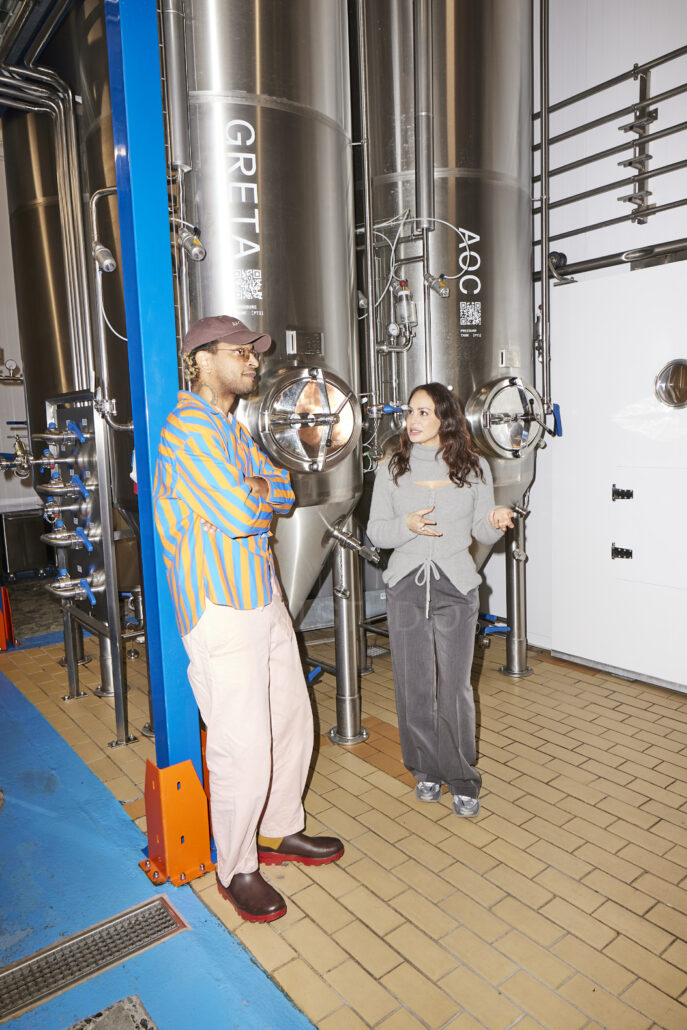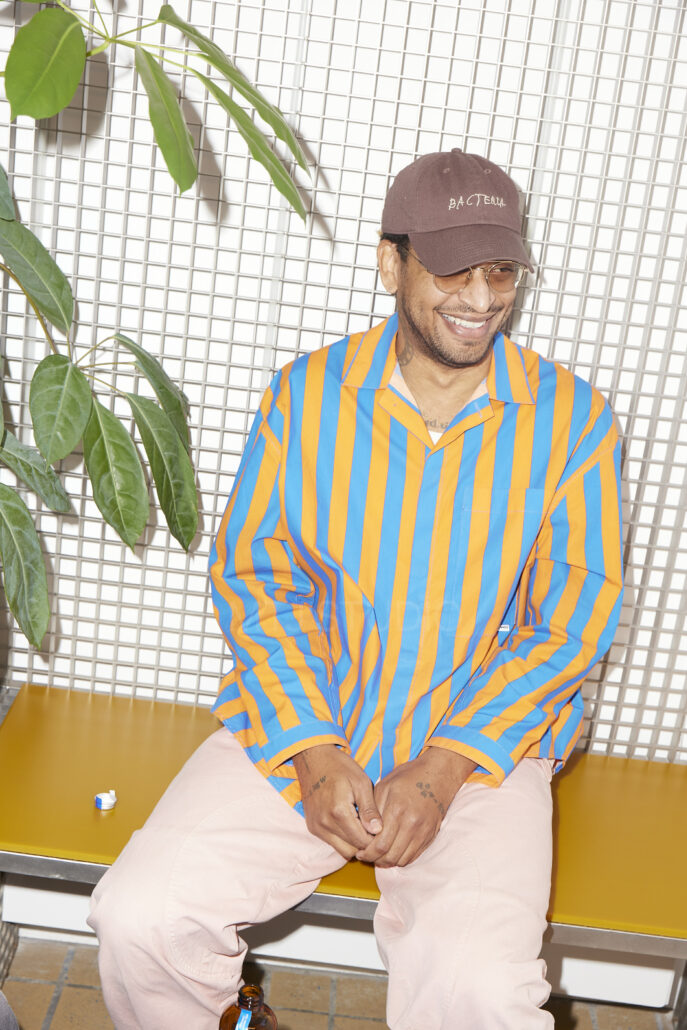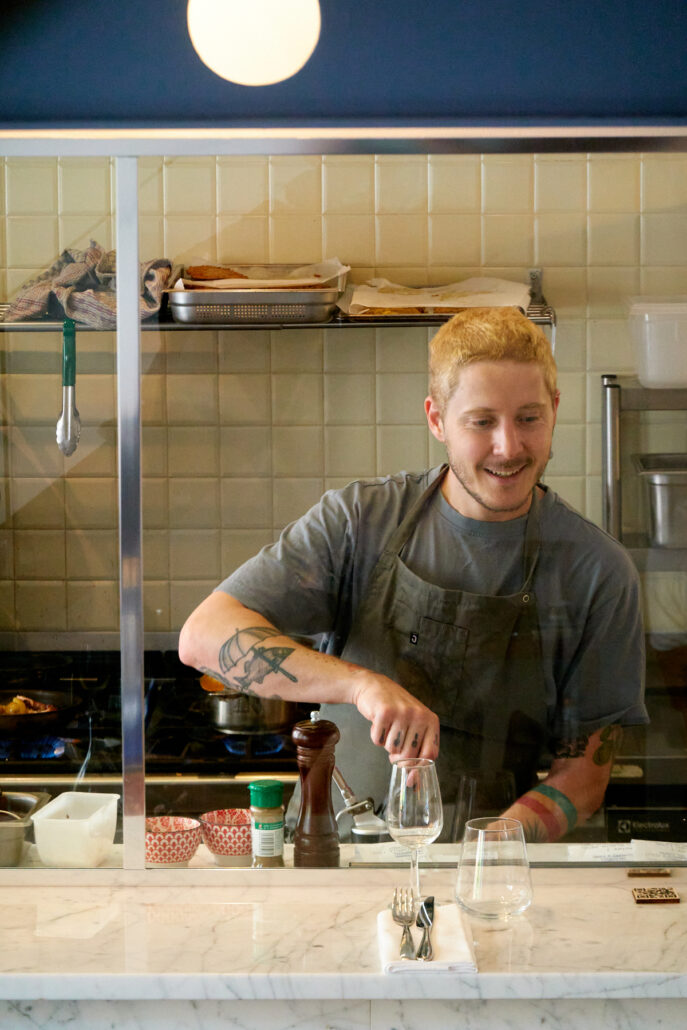Author, chef and former Head of Fermentation at restaurant Noma, David Zilber is perhaps best known for his work in ferments, a practitioner and a writer.
Yet his approach to it transcends definition, it opens up to a myriad interpretation of the act and concept of fermenting – equal parts art, science and philosophy. Ultimately, he says it is about pleasure. Here, he talks about writing a book on fermentation at its very core, how viable change has to be delicious and more essentially, the sweetness of life.
Always stylishly clad David Zilber starts his workday with a site visit to the recently opened brewery Folk Kombucha in Copenhagen’s dynamic Meatpacking District. Founded by food scientist Nina Parna, it makes some of the tastiest kombucha we have had, with a solid base of green tea and lemon verbena with a certain kind of simplicity to their botanics. Zilber now works with Chr. Hansen, the Danish biotech company with more than 40.000 microbial strains at their hands, and among them are the probiotics that Parna is looking into for Folk. He seems at home in a space dedicated to bacteria, full of stainless-steel tanks bubbling away. Later in the afternoon, we catch up with David at Studio X Kitchen, a neighbourhood café he frequents.

AL: I heard you were not too keen on speaking about fermentation today. What are you working on these days?
DZ: I’m writing, I come here to write. A book on fermentation (haha). Surprise, surprise.
AL: What is there more to say about fermentation?
DZ: You’re right, there are slews of books about fermentation. Michael Pollan dedicated half of Cooked: A Natural History of Transformation (2013) to fermentation and he did a great job of it.
Cookbooks aside, this is not a cookbook. Even considering Sandor Katz’ book of essays ‘Fermentation as Metaphor’ (2020), I have never read a book that is about fermentation at its core. So that’s the book I’m writing, a porthole that enables the reader to pick apart the machinations of the natural world and our part in it.
It is a book about science, and of science. But it is equal parts philosophy.
AL: What has the process of writing it made you realise?
DZ: Something occurred to me today as I was writing. I was trying to look up the core underpinnings of life. How do bacteria actually ferment? The deeper you get into biology, the more you realise that all kinds of biology are just cycles. In the fermentation that takes place within bodies, in your muscle cells when you exercise, for example, those same cycles appear. Playing out on the smallest and biggest levels.
Everything that is left to say about fermentation gets into these cycles, but there is no beginning and there is no end. To explain any one feature of fermentation you have to bring along the entire web. It is a tricky book to write because how do you explain something in a linear format that has no beginning and has no end? And if you want to talk about any feature of it, you will invariably touch upon all the other features. Christopher Nolan would be great at writing this, he does not think in linear time.
What’s left to say? It is my job with this book to make all those interconnected cycles comprehensible, and once you have them in your mind, the whole world looks different. That is what I am trying to do. It is not easy.
AL: Wow. What does a book like that look like?
DZ: The book is divided into 3 parts. I talk about three different styles of fermentation, each an example I blow up to look at these different meta themes I am trying to explore. I said to my editor Laura, this could be a book just about palm wine. It could be a book just about yoghurt. It could be a book just about soy sauce. And I could make all the same points. But I believe that people want to read about a variety of things.
There is a lot to explore and there are stories behind each of these different styles. That’s the thing. Whether you want to explain spontaneity, biological attraction, or persistence, longevity, and robustness. Any ferment on earth can do all those things, every ferment has a story to tell about each one of these very profound features of living systems.
They fold back into each other, laminate and twist around in a knot. Interrelated. And it is very hard to pick apart. That is probably why I have already been writing this book for three years. It is a big book.
AL: How do you go about solving this impossible task?
DZ: I mean, fermentation is something you can get a handle on. I do not want to say that it is uncomplicated, but it is a system of manageable and comprehensible parts and players that people encounter on a daily basis.
AL: And on some level, extremely observable.
DZ: Exactly. And relatable. I keep saying that it is an extremely good topic through which to get a grasp on the bigger picture, of understanding the elemental parts of life. When I say that this is a book about what fermentation is like, I really mean it. On the deepest level, what is fermentation? It’s not about some fun things for you to ferment at home guided by insights I’ve gotten from doing it myself.
This is like a sweeping work that stretches across disciplines. It kind of blows past fermentation as food. Of course, there is a lot of food in it, but it is more about food as a biological process. Understanding that and the relationships that make these foods are very interesting.
I keep going back to food, using food as examples and test subjects in these thought experiments. By the end of the book, you will hopefully end up with a much broader understanding of the natural world. Let’s see if I pull it off.
AL: I think there is something of a tension between art, science and food in your practice.
DZ: I think I have always been a creative person, expressive. Food happens to be the medium I fell into, so I think I have tried to give myself just about any excuse to be expressive within that medium. And I have always loved science, always been a tinkerer and wanted to know why stuff works at a really young age.
Any artist is constantly doing experiments. You are constantly testing your own ability to manipulate the world to achieve some results. Science works the exact same way. There is a great method to the experiment, but it also takes creativity to put it together. It takes an expansive mind and sense.
AL: What could the three disciplines of arts, science and food learn from each other?
DZ: Part of my approach to affecting change in the food system is that it has to be tactile. I always say it has to be delicious. You want to change people’s eating habits, you can look into the science of what is better. If it’s not deeply satisfying, you are not going to change consumers’ minds. Not by shaming them, by frightening them, or by scolding them.
They must eat what you think is better for the world or better for them – and be extremely satisfied by it. Full stop. In the hopes that you have consumers that are curious enough to try something new, you cannot disappoint them by feeding them something bad.
AL: How does art play into that?
DZ: I think that gastronomy, or what we call the culinary arts, is an artform. It is an art. It runs on intuition. We have tried to study that and quantify it to understand consumer behaviour, but all those results still do not add up to the clarity of execution of a well-trained chef or an artist who has mastered their craft.
I was talking to a friend about this last night, he was telling me about the culture of the company he works at. They had a saying: “We lead with intuition, and we back it up with data”. I think that is the most effective way to apply the intersection of art and science.
Intuition cuts a lot of crap out of the picture. Those ineffable experiences calcify in your mind and soul, over time. They lead you to know in your heart what is or is not right in a plate of food. How much salt it needs. The feeling of salt crumbling through your fingers like every good chef knows, measuring salt with their sense of touch. Backing it up with their tongue.
And if you’ve cooked a long time, you know that that pinch is the amount of salt needed to season it. You just know and it’s right. Maybe within just one adjustment, but after that you’re there.
L’intuizione elimina molte cose. Quelle esperienze ineffabili si calcificano nella mente e nell’anima, nel tempo. Ti portano a sapere nel tuo cuore cosa c’è o non c’è di giusto in un piatto. Di quanto sale ha bisogno. La sensazione del sale che si sbriciola tra le dita come ogni buon cuoco sa fare, misurando il sale con il tatto. E con la lingua. E se si cucina da molto tempo, si sa che quel pizzico è la quantità di sale necessaria per condire. Lo sai e basta, ed è giusto. Magari con un solo aggiustamento, ma dopo sei a posto.


AL: So, the intuition is the human component that is necessary to make it comprehensible.
DZ: Quite literally. I am sure science could tell you the actual sodium content of 18.000 different dishes available in the grocery store, but that does not take into account how salt interacts with other ingredients.
How does something salty taste like when there are acids present? Fats or umami? A chef understands how to moderate that sensory input and is able to change it on the fly from the initial taste. Processing in the brain and transmitting it to the fingers. That is the art – something as simple as seasoning food. It is an art that no amount of hard scientific data could ever be worth.
AL: How does literature play into what you do and how you see the world?
DZ: The authors I have read, learned from and know, all say you have to read a lot of books to write a book. Maybe I have been preparing myself to write this book since I was 21, when I started reading as avidly as I do now. I do read a lot. I think you have to read about what you are actually interested in. It becomes more enjoyable when you do. Reading has to be enjoyable.
AL: Like food has to be delicious.
DZ: Exactly. Pleasure is the only way to convince anyone of doing anything. This is kind of what I am writing about right now. Chemotaxis and bacteria’s ability to sense and taste the world. They effectively taste their surroundings and act on them.
AL: That in itself is such an enticing thought. Unless the world tastes bad.
DZ: The thing is that it does not. What is even bad? If you’re into it, it does not taste bad. This is why I said the book is about food and science, but also philosophy. The world doesn’t taste bad because life exists, and life thrives. Organisms are not separate from their environment, they are of their environment. Products of it. Situated in the environments out of which they are made.
Any idea of boundaries is completely illusory. So the fact that these organisms exist in the world, that they consume the world and that they thrive in the world – that one of the first senses to evolve was the sense of taste – literally helps me make sense of the world. To understand what is beneficial to and what is detrimental to it. The world is by definition sweet.
AL: What do you mean by sweet?
DZ: It might feel counterintuitive to divorce the notion of sweetness from sugar. What I mean is that life has the desire to live. We are talking about pleasure. Life’s desire to live, whether you’re a bacterium or a person, a cow, or a plant, is intrinsically linked to the ability to know, and that any actions that are informed by knowledge carry with them the emotional and sensory phenomenon of sweetness.
Like life is, sweet. If you are alive, if you must live, you have to know what’s in your environment and understand what in your environment will keep you alive. You have to be able to embody the concept of sweet, feel that. Sweetness is the impetus to keep living. The promise of it is the drive to keep searching for it and when you find it, it is phenomenal.
Sweetness is the impetus to keep living.




